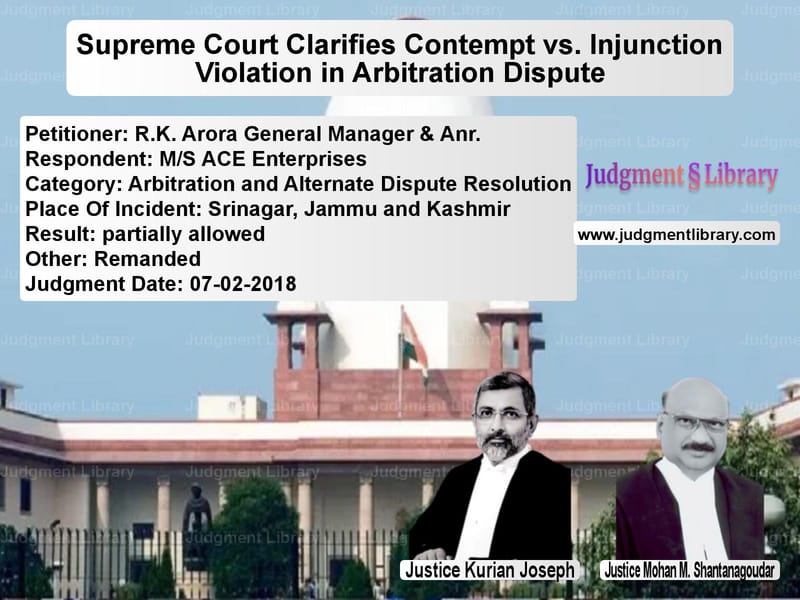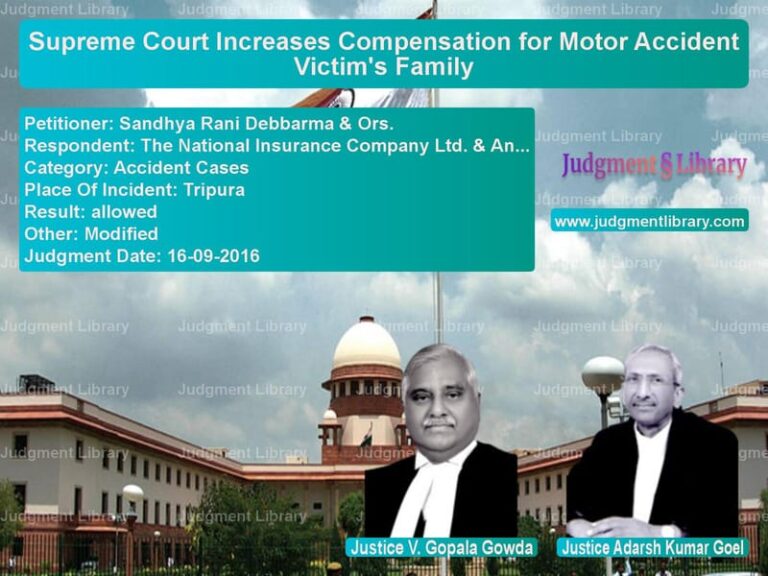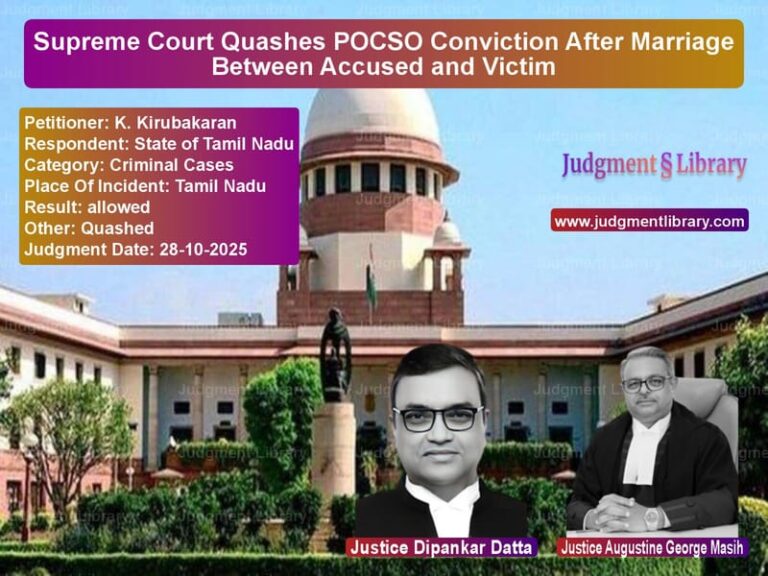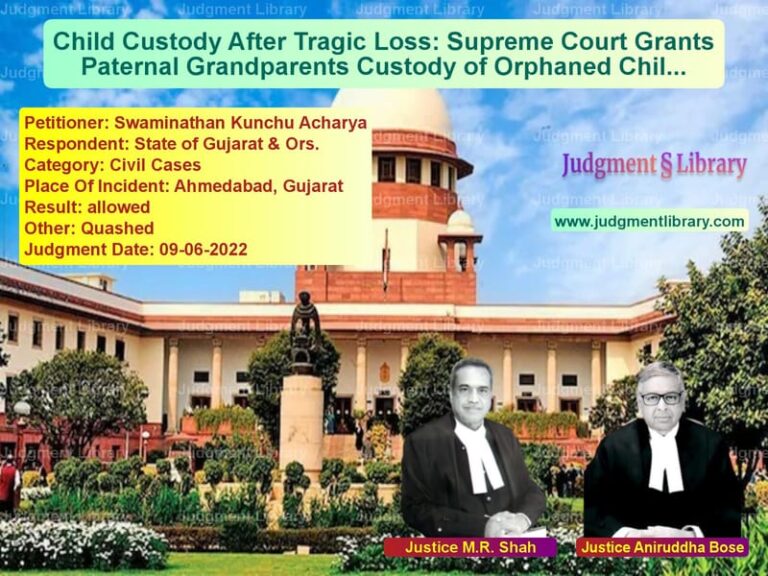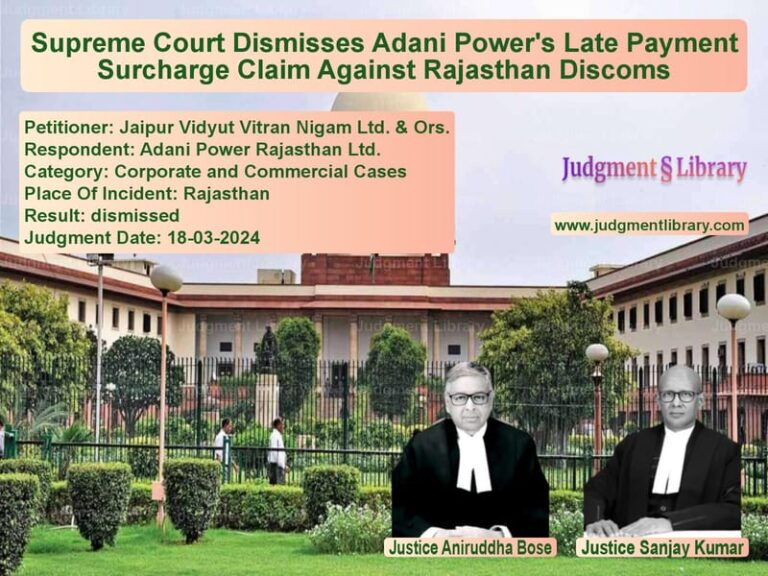Supreme Court Clarifies Contempt vs. Injunction Violation in Arbitration Dispute
The Supreme Court of India recently ruled in R.K. Arora General Manager & Anr. vs. M/S ACE Enterprises, clarifying the distinction between contempt proceedings and action under Order XXXIX Rule 2A of the Jammu and Kashmir Code of Civil Procedure. The case arose from an arbitration dispute where an injunction order was allegedly violated, leading to contempt proceedings initiated in a trial court.
Background of the Case
The dispute originated from an arbitration proceeding between M/S ACE Enterprises and the Union of India, where the Court of Small Causes, Srinagar, issued an injunction on June 22, 2011, staying arbitration proceedings until objections were filed. Despite this, the arbitration continued, leading the respondent (M/S ACE Enterprises) to file an application seeking contempt proceedings against the petitioners.
The trial court found no contempt, ruling that the arbitration proceedings were conducted based on the parties’ understanding of the injunction order. The respondent then appealed to the Jammu and Kashmir High Court, which set aside the trial court’s order and ruled that the trial court lacked jurisdiction to handle contempt matters. This led to the present appeal before the Supreme Court.
Arguments Presented
Petitioners’ (R.K. Arora & Union of India) Arguments
- The trial court correctly found no deliberate violation of the injunction order.
- Contempt jurisdiction was wrongly invoked as the matter involved procedural irregularities, not willful defiance.
- The High Court erred in treating the matter as contempt instead of addressing the alleged violation under Order XXXIX Rule 2A.
Respondents’ (M/S ACE Enterprises) Arguments
- The petitioners ignored the trial court’s injunction and proceeded with arbitration, amounting to contempt.
- The High Court was justified in staying the arbitration award.
- Violation of judicial orders undermines the authority of the courts and should not be overlooked.
Supreme Court’s Ruling
A bench comprising Justice Kurian Joseph and Justice Mohan M. Shantanagoudar ruled that the case did not qualify as contempt but rather as a violation of an injunction order, which should be addressed under Order XXXIX Rule 2A.
1. Contempt vs. Order XXXIX Rule 2A
The Court clarified that contempt proceedings and action under Order XXXIX Rule 2A serve different purposes. The judgment stated:
“Though an application for contempt was filed before the trial court, it was, in fact, a petition for taking action under Order XXXIX Rule 2A of the Jammu and Kashmir Code of Civil Procedure. It is not a case for initiating contempt on the face of it.”
2. Lack of Willful Disobedience
The Supreme Court found that the arbitration proceedings continued due to a misunderstanding rather than intentional defiance of the injunction order. It ruled:
“Exercise of statutory remedy and proceedings under the special act, cannot be scuttled in ordinary course of events. Only if the statute provides for such exercise of power by the civil court, the civil court can enter into the domain of such jurisdiction.”
3. Remanding the Matter to Trial Court
The Court directed that the respondent’s contempt application be treated as an application under Order XXXIX Rule 2A and renumbered accordingly. It instructed:
“The trial court shall first see whether there is any disobedience of the order of injunction and in case the court enters a finding of disobedience, the rest under Order XXXIX Rule 2A alone shall follow.”
Key Observations
- The ruling reaffirmed that contempt powers should be exercised cautiously and only in cases of clear, willful disobedience.
- The Court emphasized that statutory remedies under special laws should be preserved unless explicitly overridden by a court order.
- By remanding the matter under Order XXXIX Rule 2A, the Court ensured that procedural fairness was upheld without unnecessary contempt proceedings.
Conclusion
The Supreme Court’s judgment in R.K. Arora General Manager & Anr. vs. M/S ACE Enterprises establishes a critical distinction between contempt proceedings and the enforcement of injunction orders under procedural law. The ruling ensures that parties adhere to due process while preventing the misuse of contempt jurisdiction for procedural disputes.
Petitioner Name: R.K. Arora General Manager & Anr.Respondent Name: M/S ACE EnterprisesJudgment By: Justice Kurian Joseph, Justice Mohan M. ShantanagoudarJudgment Date: 07-02-2018
Don’t miss out on the full details! Download the complete judgment in PDF format below and gain valuable insights instantly!
Download Judgment: R.K. Arora General M vs MS ACE Enterprises Supreme Court of India Judgment Dated 07-02-2018.pdf
Direct Downlaod Judgment: Direct downlaod this Judgment
See all petitions in Arbitration Act
See all petitions in Enforcement of Awards
See all petitions in Dispute Resolution Mechanisms
See all petitions in Judgment by Kurian Joseph
See all petitions in Judgment by Mohan M. Shantanagoudar
See all petitions in partially allowed
See all petitions in Remanded
See all petitions in supreme court of India judgments February 2018
See all petitions in 2018 judgments
See all posts in Arbitration and Alternate Dispute Resolution Category
See all allowed petitions in Arbitration and Alternate Dispute Resolution Category
See all Dismissed petitions in Arbitration and Alternate Dispute Resolution Category
See all partially allowed petitions in Arbitration and Alternate Dispute Resolution Category

